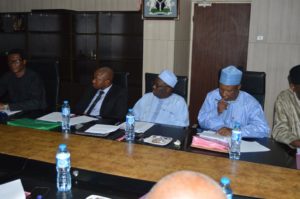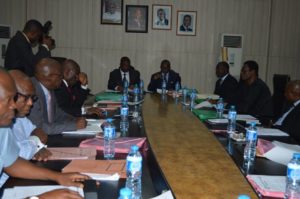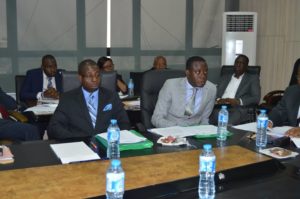By CrossRiverWatch Admin
BEING REMARKS BY SENATOR VICTOR NDOMA-EGBA SAN, CHAIRMAN OF THE BOARD OF THE NIGER DELTA DEVELOPMENT COMMISSION NDDC, ON THE OCCASION OF THE BOARD’S INAUGURAL MEETING HELD ON THURSDAY 26 JANUARY 2017 AT THE COMMISSION’S HEADQUARTERS IN PORT HARCOURT.

It is my pleasure to welcome you my distinguished colleagues to the inaugural meeting of the Board of the Niger Delta Development Commission to which we were graciously nominated by Mr. President and Commander-in Chief President Muhammadu Buhari, and confirmed by the Senate of the Federal Republic of Nigeria in consultation with the House of Representatives.
I congratulate us for our respective appointments and thank Mr. President for finding us worthy of his trust at this critical point in the history of the Niger Delta Region.
We had held an extra ordinary meeting in Abuja on 14th November 2016 but this is our inaugural meeting, our first and is being held in our Boardroom at the Headquarters of the Commission.
The NDDC was established in 2000 by the Niger Delta Development Commission (Establishment, Etc) Act which repealed the Oil Minerals Producing Areas Commission Decree of 1998 with a mandate to facilitate the rapid, even and sustainable development of the Niger Delta Region into an economically prosperous, socially stable, ecologically regenerative and politically peaceful area.
To achieve these objectives a well articulated, home grown Niger Delta Regional Development Master Plan was commissioned and launched by then President Olusegun Obasanjo on March 27, 2007.
Chief Obasanjo said of the plan at its launch “What we have is not an NDDC plan but a peoples plan, one that one and all can claim ownership of. The collective vision of the stakeholders captured in the Master Plan is the accelerated development of this hitherto turbulent and underdeveloped region into Africa’s most peaceful, most prosperous and most pleasant region”.
Today the Region has become even more turbulent and more underdeveloped than when the Master Plan was launched, clearly because the Master Plan was abandoned after all the fanfare that attended its launching.
The Commission lost its focus as a Development Commission or Agency and has rather acquired the reputation, rightly or wrongly of a contract awarding factory or machine, delivering little impactful development to the Region.
We are coming on board at a very challenging time. The public image of the Commission is not edifying. The militancy, restlessness and lack of development are most unnerving.
We must therefore refocus the Commission to its original mandate and make it the vehicle to bring development and peace to our troubled Region and restore the confidence of stakeholders, and indeed Nigerians in the Commission.
We must rebrand the Commission and change the public perception of it as a slush fund and this we must do through our honest work and single minded focus and discipline. Above all we must reform.
We must do things differently if different results must be achieved. We must see our appointments as a life time opportunity to make a real difference in the lives of the ordinary people of the Region and write our names in gold for posterity and not an opportunity for our own slice of the proverbial national cake or short term benefits. We should keep our eyes on history.
The need to make the difference is an imperative choice we must make if history must judge us fairly. How history judges us, whether kindly or harshly, is for us to choose.
Previous interventions in the Region have been unremarkable. The Niger-Delta Development Board (1961-1972), Niger-Delta River Basin Authority (1972-1983), Oil Minerals Producing Areas Development Commission (1992-2000) to the NDDC all failed for loss of focus, mismanagement, inadequate funding, corruption and the lack of the appropriate will to develop the Region.
Though our time is short, it is long enough for us to chart a new path. On my part I am determined to do just that and I believe that individually and collectively we share the same strong desire to bring change and deliver development to our long suffering people.
To be effective and transparent, the Commission must shed weight and unnecessary baggage and burdens.
In keeping with Mr. President’s change agenda and global best practices we have to audit our systems, processes, projects, and staff.
The Commission must be transparent so that we can get more support from stakeholders and engage the attention of International Development partners.
We shall engage constantly with stakeholders and ensure that all organs of the Commission are activated and are functional.
We should commit to transparently removing all impediments to the effective delivery on our mandate, and build strong systems and processes.
Ours is the very first Board under the APC government. Our attitude, policies and programmes must reflect the values of the government and Party. We are bound by the Party’s Change Agenda.
We shall be open to suggestions that will facilitate our vision and ensure value for money spent.
The Board will set quarterly targets, milestones, benchmarks and responsibilities that will form the focus for each quarter.
Achieving these targets will be the core oversight function of the Board committees that will be set up soon.
Our budget process must be stakeholder and end user driven and owned with clear impact assessment.
We shall evolve strategies to enhance staff productivity and compensation. Staff welfare shall be given priority attention.
It will no longer be business as usual. The story in the public is that a ‘Commission’’ of 10-15% is paid by contractors to get their payments from the Commission.
This is absolutely wrong if it is true. Getting payments for contractors has become an industry by itself. There is no reason why contractors who have met conditions for payment should not be paid without any intervention. We must streamline our processes to ensure this.
The powers of this Board are granted by Section 8 of the Act establishing the Commission to include, amongst others;
a) Manage and supervise affairs of the Commission
b) Make rules and regulations for carrying out the functions of the Commission
c) Enter and inspect premises, projects and such places as may be necessary for the purposes of carrying out its functions under this Act
d) Pay staff of the Commission such remuneration and allowances as appropriate
e) Enter into such contracts as may be necessary or expedient for the discharge of its functions and ensure the efficient performance of the Commission; and
f) Do such other things as are necessary and expedient for the efficient performance of the functions of the Commission
Section 12 provides for a Managing Director and two Executive Directors. The Managing Director is the Chief Executive and accounting officer and is, subject to the general direction of the Board, responsible for
a) the day to day administration of the Commission
b) for keeping the books and proper records of the proceedings of the Board; and
c) for (1) the administration of the Secretariat of the Board; and (2) the general direction and control of all other employees of the Commission.
The Board drives the vision and policies of the Commission while the management led by the Managing Director and the Executive Management implements them.
Therefore there must be synergy and constant consultation between the Board and the Executive Management for optimal results. The Board and the Executive Management which is part of this Board must remain one and act in tandem.
One house keeping I must address is the place of administrative Government Circulars in the administration of the Commission.
Government Circulars are usually to streamline policies or to clarify procedures where there is a lacuna. The Commission will abide by circulars in the appropriate situations.
Where however the law makes clear and unambiguous provisions, the law supercedes the circulars. The bureaucrats should be guided accordingly.
Our policies must create a diversified Regional economy driven by ICT, Agriculture, Manufacturing, Youth Development and Sports, engender peace and Security, protect the environment and remedy it where applicable, empower the youths and encourage entrepreneurship.
We must win the confidence of all stakeholders. To achieve this, our processes and systems must be transparent.
In summary, we have to:
Make the Commission’s systems and processes more transparent. Opportunities have to be created for public participation to engender confidence in the activities of the Commission by all stakeholders in the region.
To curtail indiscriminate contract awards in the Commission, the Board’s approval must be obtained for all procurement (Projects/Programmes).
The Board must adopt policies that would moderate or streamline the number of new procurement in the Commission, given that as at today, NDDC has over 9000 (nine thousand) ongoing projects, most of which are experiencing funding, implementation and other challenges.
The Board must determine the status of each ongoing projects/programmes and put in place a mechanism to re-evaluate the viability of some projects, revise the scope of others, re-negotiate the cost of some and relocate/merge others,
Evolve a strategy for settling verified debts.
Because of paucity of funds, Projects and Programmes prioritization is inevitable at this stage, Deliberate efforts must be made to determine the number of projects that can be focused upon and quickly completed (from the huge backlog of the Commission’s project portfolio).
As a matter of urgency, the Corporate HQ Building of NDDC and the remaining State Office Buildings must be given serious attention by the Board.
Appointments and postings of staff must be based on equity, competence and determinable criteria.
Building synergy with all critical stakeholders especially the Amnesty Programme, the Ministry of Niger Delta Affairs, and relevant Ministries, Departments and Agencies, Development Partners and Security Agencies etc.
Efforts must be made to implement an NDDC master plan. Ad hoc, “short term” solutions have proved unsustainable.
We have to transparently and strategically engage critical stakeholders; the Governors, the members of the State Houses of Assembly, the Staff, Traditional Rulers, Oil Companies, Youths (including the agitators) Women, the Disabled, Environmental Right Activists etc. Efficient collaboration will make the Commission an actual Development Agency instead of its present perception as a Contract Awarding Commission.
Private sector participation will have to be encouraged in the various developmental activities while development partners will be engaged to ensure delivery of relevant projects in the Niger Delta Region.
Involvement of the Communities in the sustainable clean up of the environment. Traditional and Community Leaders must be educated on the menace of pipeline vandalism, and its effect on the environment. Communities have to be encouraged on proper waste management and the impact on the economy. The commission will identify beneficial ways of converting waste to wealth.
Addressing security concerns will be critical to achieving the mandate of the commission. The Security Agencies must be continually encouraged, as security is needed for the sustainable development of the Niger Delta. Traditional ways of justice administration and alternative dispute resolution may be adopted in some cases rather than relying on force at all times, to redress misconduct.
People in the informal economy have to be identified and catered for. We must put in place a pragmatic youth empowerment policy which will enable the area’s youth to discover their talents and live useful lives. Training and retraining of the youths will continue to benefit the region.
Appropriate training modules have to be identified for training the youth of the Region. This will be in consultation with the Amnesty office and development partners. This will improve stability and assure potential investors, local and foreign of the safety of their investment.
Empowerment of the indigenes has to be sustainable, based on needs assessment. Enhancing the position of women is also very important. Creating opportunities for women will help in addressing their needs and recognize their role in the community as peace makers.
Appropriate medical facilities and personnel will be deployed for the well being of the people of the region. Trained and qualified manpower will be assembled to attend to individual and specific health needs of the various communities.
Corporate social responsibilities of International and National oil companies have to benefit the people. These companies will be encouraged to improve their relationship with the host communities under the coordination of a unit of the Commission.
Improve transportation infrastructure by providing alternative and cheaper means for efficient movement of people and goods.
Work with relevant agencies of government and the private sector to provide appropriate, alternative and reliable supply of Electricity to the communities especially those of the hinterland in the region.
Review the scholarship programme to improve local content.
Sports development will be encouraged to give our youths a sense of competitiveness.
We cannot have any development without peace and security in the Region. We cannot complain about environmental pollution and degradation in the Region and at the same time engage in activities like pipeline vandalisation and breaches that not only pollute and degrade the environment but also shield those who should bear responsibility for the sorry state of our environment from liability.
All of us from the Region must take responsibility for peace and security in our own interest and in the interest of generations to come. All of us must be committed to the peace, security and prosperity of our Region. It is our duty.
We thank President Muhammadu Buhari for his various goodwill and good faith gestures to the Region; the increase in the budgets of the Ministry of Niger Delta Affairs, the NDDC and the Amnesty Programme; the new urgency for the completion of the East-West Road, the East-West Rail line, the Ogoni clean up, the recent dialogue with leaders from the Region, the current initiative by the Vice President, Prof Yemi Osinbajo GCON, the assurance of the Maritime University in Gbaramatu, etc.
We should have faith in President Buhari’s goodwill and good faith towards the Region and create the enabling environment for these to be fully expressed and established.
We appeal to all the Militant groups to stop the breaches and vandalisation of oil facilities. Their point has long been made. Now they are inflicting injuries and suffering on themselves and our already hapless and helpless people. They should give us a chance to develop.
In conclusion, let us be reminded of the eternal words of Theodore Roosevelt, one time President of the United States of America. “Much has been given us, and much will rightly be expected from us. We have duties to others and duties to ourselves; and we can shirk neither”.
We have enormous work to facilitate the all-round sustainable development of the Niger Delta. We must rebrand, we must refocus, and we must reform. The time to start is now.
To God be the Glory.
PICTURES FROM THE MEETING





Leave feedback about this